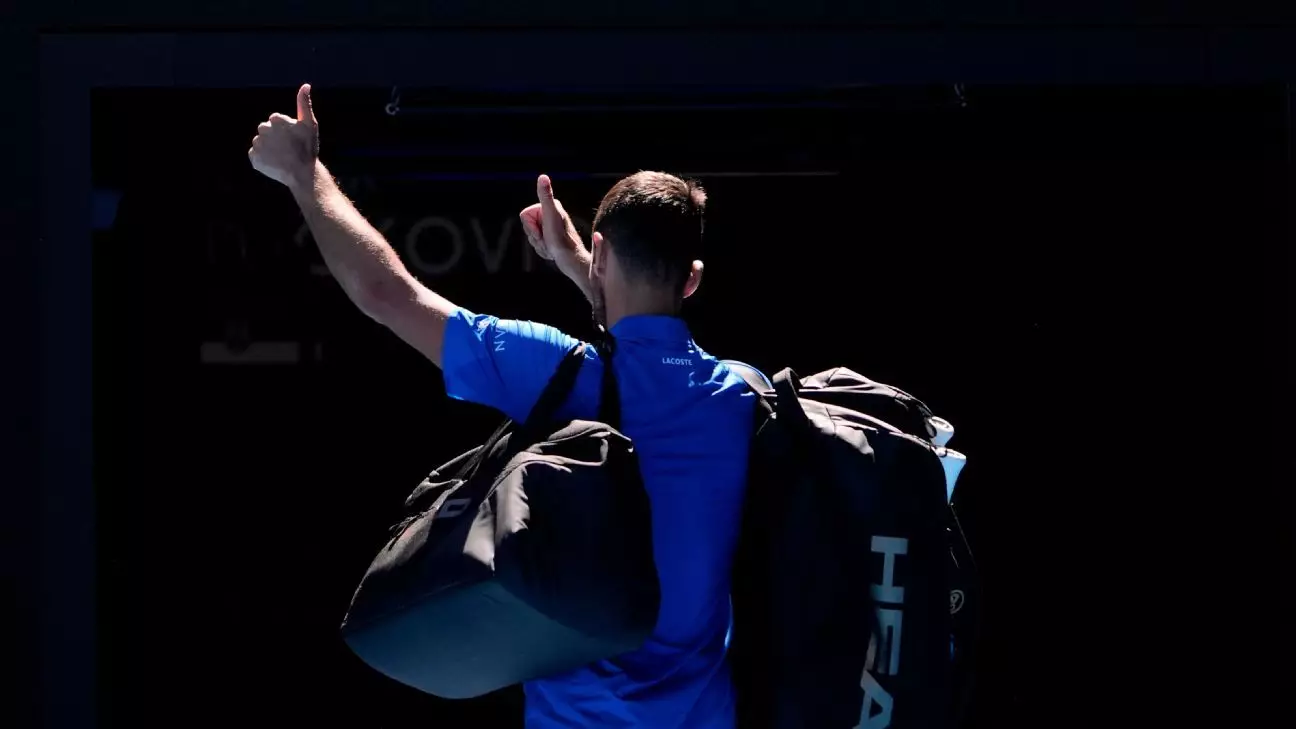In a gripping Australian Open semifinal that many anticipated would be a showcase of athletic prowess, the tennis world witnessed a heartbreaking scene as Novak Djokovic was forced to retire mid-match against Alexander Zverev. The 24-time Grand Slam champion, who had confidently progressed through the tournament, succumbed to a muscle tear in his left leg. This sudden exit marked not only a setback for the athlete but also left fans in disbelief at Rod Laver Arena, where hopes of an epic battle dissipated into disappointment.
Djokovic entered the match with heavy strapping on his left thigh, an indication of his struggles with injury earlier in the tournament, specifically during his quarterfinal clash with Carlos Alcaraz. In an unexpected turn, after losing a grueling first set in a tiebreak after 81 minutes, Djokovic approached the net to shake hands with Zverev, signaling the end of his aspirations for an 11th Australian Open title. The frustration of the crowd was palpable, echoing in boos as he walked off the court, a sentiment Djokovic addressed with a resolute thumbs-up.
In a post-match interview, Djokovic candidly expressed the emotional toll of his withdrawal. “I did everything I possibly can to manage the muscle tear,” he lamented, highlighting how he battled through physical pain until it became unbearable. Despite utilizing medications, physiotherapy, and supportive strapping, the toll of the match evidently outweighed his capacity to continue. He acknowledged that even a potential first set win would have set the stage for further strife in matching Zverev’s prowess, rendering him incapable in a physically demanding contest that could have lasted for hours.
This sentiment raised broader concerns about Djokovic’s increasing vulnerability to injuries, especially during pivotal Grand Slam matches. The champion conveyed a sense of frustration and introspection: “It is true that, you know, getting injured quite a bit the last few years. I don’t know what exactly is the reason for that.” His admission pointed to a deeper angst regarding his physical condition and the fragility it brings to his illustrious career.
Zverev’s Respect for Djokovic
In the aftermath of Djokovic’s retirement, Zverev took a moment to address the crowd, imploring fans to show more respect for an injured player. His call for compassion resonated strongly across the tennis community, reminding spectators of the unpredictable nature of athleticism and the essential respect athletes deserve, even in disappointing circumstances. “He has won this tournament with an abdominal tear, won this tournament with a hamstring injury,” Zverev stated, drawing attention to the remarkable resilience Djokovic has displayed throughout his career.
As Zverev prepares for his first Australian Open final against either Jannik Sinner or Ben Shelton, his respectful defense of Djokovic only enhances the camaraderie often seen among professional athletes. It sheds light on a culture of competition that respects the physical and mental endurance required to perform at such a high level, emphasizing sportsmanship amid fierce rivalry.
The road ahead for Djokovic is uncertain yet crucial. He plans to undergo further medical evaluation upon returning to Europe to assess the extent of his injury and rehabilitation options. “I still have the Doha tournament in a few weeks’ time scheduled,” he mentioned, reflecting the critical decision at hand in evaluating his readiness to compete. The dual nature of a champion—a relentless drive for victory paired with the reality of physical limits—emerges vividly in his reflections.
Although setbacks in a storied career can be disheartening, Djokovic’s determination to continue competing in Grand Slam events shines through. “As long as I feel that I want to put up with all of this, I’ll be around,” he concluded, hinting at his undying spirit in the face of adversity. This resolve serves as a reminder of the tenacity that has defined his remarkable journey, showcasing that even champions must navigate the challenging waters of injury and recovery.
In essence, Djokovic’s retirement not only reshapes the narrative of this Australian Open but also spotlights the intricate relationship between resilience and vulnerability that every athlete faces. As fans and pundits reflect on this unexpected chapter, Djokovic’s legacy remains firmly intact—a testament to the complexity of sportsmanship, the unpredictability of competition, and the indomitable will to overcome challenges.

